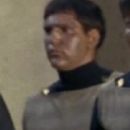BASIL POLEDOURIS-MUSICIAN-COMPOSER-ORCHESTRATOR
editBasil Poledouris (August 21, 1945 – November 8, 2006) was an American music composer who concentrated on the scores for films and television shows. Poledouris won the Emmy Award for Best Musical Score for work on part four of the TV miniseries Lonesome Dove in 1989. He is best known for scores such as Conan the Barbarian (1982), RoboCop (1987), Spellbinder (1988), The Hunt for Red October (1990), RoboCop 3 and Starship Troopers (1997).Work with synthesizers and the traditional orchestra.
Basil Poledouris: The Collaborator
editAs much as I’ve enjoyed Basil Poledouris’ music over the years, I really didn’t know much about his life. Turns out that his rise to film scoring was very similar to other composers.
Basil was born in Kansas City, Missouri in 1945. He began with piano lessons at age 7. Originally thinking of becoming a concert pianist, his mind was changed at University of Southern California and he made his way into the cinema department. At USC, he took film composition classes with teacher Miklós Rózsa and eventually David Raksin. Also at USC at the time were John Milius and Randal Kleiser – both of which would collaborate as director with Poledouris. Besides some TV movies and documentaries, Poledouris’ big break into feature film scoring was with John Milius as director. Those films were The Reversal of Richard Sun (1970) and Big Wednesday (1978). His collaboration with classmate Randal Kleiser began with The Blue Lagoon (1980) and Summer Lovers (1982).
Poledouris’s big break came from Conan the Barbarian in 1982, directed by Milius. Given a 90-piece orchestra and full choir, Poledouris filled the film with music. The music really is a centerpiece of the film, with tons of both strong action music and lots of moments when the music is front and center. The film would define Poledouris’s style and certainly gave him worldwide attention. Although the director changed, he returned to the sequel, Conan the Destroyer (1984). Poledouris again reteamed with Milius for the Soviet invasion film, Red Dawn (1984). He expanded his repertoire with a more atonal score. Some of Poledouris’s most emotional music was written for the TV miniseries Amerika (1987). He experimented with a more electronic sound for Cherry 2000 (1987), and another electronic score for No Man’s Land (1987).
Another prominent collaboration was with Paul Verhoeven in 1985 for the medieval epic Flesh+Blood. Poledouris joined Verhoeven for the great action film RoboCop (1987). His combination of electronic synthesizers and the traditional orchestra worked perfectly for describing the main character. The next Milius collaboration was one of Poledouris’s most melodic scores – Farewell to the King (1989). It is a sweeping score, akin to John Barry’s lush scores of the same time. For the western miniseries Lonesome Dove (1989), Poledouris wrote around 4 ½ hours. The miniseries won him an Emmy Award. When Verhoeven came to score his next film, Total Recall (1990), Poledouris had to decline due to scheduling conflicts. (The score was eventually given to Jerry Goldsmith, who would collaborate with Verhoeven several other times). Poledouris’s other score happened to be The Hunt for Red October (1990). The thriller score featured Poledouris’s trademark choral sound as seen in the standout track “Hymn for the Red October”.
With the success of Lonesome Dove, Poledouris joined director Simon Wincer for the western Quigley Down Under (1990). As an opportunity to score Dances with Wolves (1990) arose, Poledouris had to turn it down to score Milius’ Flight of the Intruder. Another odd score story is for White Fang (1991). Poledouris was replaced by Hans Zimmer, but the studio chose a compilation of their cues, with a majority of cues by Poledouris who ended up getting primary credit. After handing over RoboCop 2 to composer Leonard Rosenman, he returned in 1993 to RoboCop 3. One of his biggest hits in the ‘90s came from Free Willy (1993) with director Wincer. 1994 brought a bunch of films, including children fare Lassie, and The Jungle Book. 1995 saw two sequels: Under Siege 2, and Free Willy 2.
Along with John Williams’ Summon the Heroes, Basil composed a piece called Tradition of the Games for the opening ceremony of the 1996 Summer Olympics. Among many other smaller films, Poledouris reteamed with Paul Verhoeven for Starship Troopers (1997). His daughter Zoë composed and performs one of the songs for the film, as well as showing up as an uncredited actress. As he replaced Gabriel Yared for Les Miserables (1998), he produced one of his finest scores of his career. The score was dedicated to longtime friend and orchestrator Greig McRitchie who orchestrated most of Poledouris’s scores since the 1980s.
His scores in the late ‘90s include the intimate Kimberly (1999), the baseball drama For the Love of the Game (1999). He reteamed with Simon Wincer one last time for Crocodile Dundee in Los Angeles (2001). He also composed music to The Touch (2002) and his last project, a TV movie – The Legend of Butch and Sundance (2003).
He conducted a rare concert of his own works at the Ubeda Film Music Festival in summer, 2006. Poledouris later succumbed to cancer in November, 2006 at the age of 61.
His style has been emulated over the years, as he was influenced by the great epic scores of the Golden Age. He formed strong collaborations with a few of directors and his music shined through no matter what genre. He found the emotional core of characters and situations. His romantic scores work just as well as his scores to thrillers. His love of sailing shone through in scores like Wind (1992) and Free Willy (1993). His use of synthesizers enhanced his scores and found ways to use them alongside the symphony orchestra. He hit his stride right off the bat with Conan the Barbarian, and continued to hone his craft throughout his career. Whether epic action cues, or smaller intimate moments, Poledouris’ music shines though.
His "Conan Symphony" performed at Ubeda (part 1 of 5):
Posted by Admin at 2:40 PM
Email ThisBlogThis!Share to TwitterShare to FacebookShare to Pinterest
Labels: COMPOSER
FROM:http://musicbehindthescreen.blogspot.com/2012/04/basil-poledouris-collaborator.html
You can find people similar to Basil Poledouris by visiting our lists 20th-century American conductors (music) and American male conductors (music).
| Full name at birth |
|
||
| Claim to fame |
|
||
| Date of birth | 21 August 1945
|
||
| Place of birth | Kansas City, Missouri, USA
|
||
| Date of death | 8 November 2006
|
||
| Age | 61 (age at death)
|
||
| Place of death | Los Angeles, California, U.S.
|
||
| Occupation | Composer, conductor
|
||
| Occupation category | |||
| Nationality |
PERSONAL DETAILS
| Height |
|
||
| Build |
|
||
| Hair color |
|
||
| Eye color |
|
||
| Gender | |||
| Ethnicity |
|
||
| Religion | |||
| Zodiac sign | |||
| Distinctive feature |
|
||
| Pets |
|
ADDITIONAL DETAILS
| High school |
|
||
| University |
|
||
| Talent agency |
|
||
| Political affiliation |
|
||
| Political party |
|
Basil Poledouris is known for his role in the TV series Star Trek (1966) as Trooper / Security Officer / Klingon.
He is also known for his role in the short War Gene (2020) as special thanks.
More...
This page is the FamousFix profile for Basil Poledouris. Content on this page is contributed by editors who belong to our editorial community. We welcome your contributions... so please create an account if you would like to collaborate with other editor's in helping to shape this website.
On the Basil Poledouris page you will be able to add and update factual information, post media and connect this topic to other topics on the website. This website does skew towards famous actors, musicians, models and sports stars, however we would like to expand that to include many other interesting topics.



















